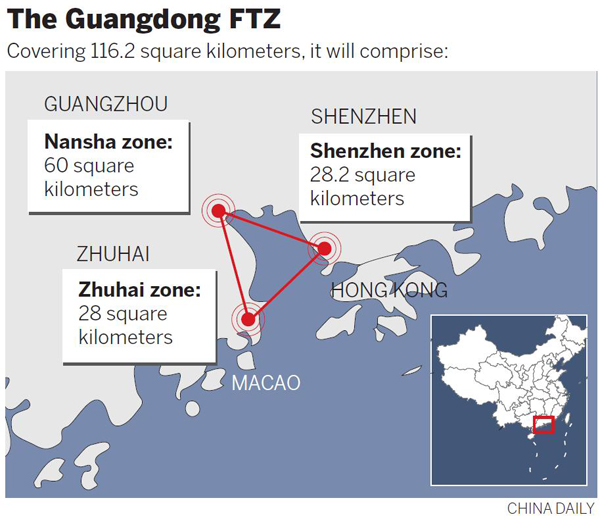Stock link bid for HK, Shenzhen
Updated: 2015-01-06 04:49
By ZHAO YINAN(China Daily)
|
||||||||

Move designed to integrate Guangdong with China's two SARs
China is considering a stock trading link program to allow Hong Kong and Shenzhen investors to buy and sell shares on each city's bourse.
The move is part of efforts to integrate Guangdong province, the mainland's reform front-runner, with the country's two special administrative regions.
Experts said the proposal, a key step in building the Guangdong Free Trade Zone, will further promote China's financial openness, following the launch of the Shanghai-Hong Kong Stock Connect in November.
Premier Li Keqiang made the announcement on Monday during a visit to Nansha New Area, one of the three areas in the Guangdong FTZ.
"One reason the central government approved the Guangdong FTZ is the geographic proximity to Hong Kong and Macao," he said.
"So the first step in building the FTZ is to deepen integration with the two special administrative regions, where the two sides can well complement each other, especially in the trade of services."
Zhu Xiaodan, the Guangdong governor, proposed issuing a list of areas off limits to foreign investors, as the Shanghai FTZ currently does. He will also issue a shorter list with fewer restrictions on Hong Kong and Macao investors.
The proposed Guangdong Free Trade Zone is modeled on Shanghai's pilot FTZ.
It is expected to be more open and closely connected with Hong Kong and Macao, especially through the Closer Economic Partnership Arrangement, a pact aimed at building closer economic ties between the three areas.
The Guangdong zone, covering 116.2 square kilometers, includes Qianhai and Shekou Industrial Zone in Shenzhen, Hengqin in Zhuhai and Nansha in Guangzhou.
Li said reforms and opening-up do not equate to high-rises and metropolises, but rather to the talent and services inside the buildings.
Zhu said the Guangdong FTZ will mark the boundaries between regulatory power and the market, clarify the government's responsibilities and its legitimate supervisory area.
"As the starting point of China's ancient Silk Road, Guangdong aims to become an important transportation hub for the country's proposal to build a maritime silk road linking Southeast Asian countries with the northern part of China," he said.
Tang Shiqi, a professor at Beijing Normal University in Zhuhai, suggested the three areas of the Guangdong FTZ should maintain a different focus during its development.
Qianhai Cooperation Zone should continue to focus on the development of the high-end services industry, while Hengqin should mainly cover tourism, commercial services and high-tech industries. Nansha, the largest area in the zone, should upgrade its port facilities and promote manufacturing industries, he said.
Pan Zhihong, deputy head of the China Society of Economic Reform Journal Agency, said Li's visit pushed governments to implement the reform policies hammered out by the central government last year, as 2015 will be key to the full operation of these reforms.

 Memory of stampede victims honored on 7th day
Memory of stampede victims honored on 7th day
 Russian airline stewardess flying over China
Russian airline stewardess flying over China
 Two New York policemen shot after armed robbery
Two New York policemen shot after armed robbery
 Alabama puts spotlight on China in 2015
Alabama puts spotlight on China in 2015
 Young men farm for the future
Young men farm for the future
 Sausage seller uses mobile payment for better hygiene
Sausage seller uses mobile payment for better hygiene
 Top 10 biggest recall of cars in China in 2014
Top 10 biggest recall of cars in China in 2014
 Culture Insider: 6 things you may not know about Minor Cold
Culture Insider: 6 things you may not know about Minor Cold
Most Viewed
Editor's Picks

|

|

|

|

|

|
Today's Top News
Two New York policemen shot after armed robbery
US stands by plan to pull troops from Afghanistan
ZTE talks mobile at CES
Top 10 biggest recall of cars in China in 2014
Two New York City police officers shot and wounded
NYC rallies around Liu family
Community rallies around Liu family
Stock link bid for HK, Shenzhen
US Weekly

|

|







